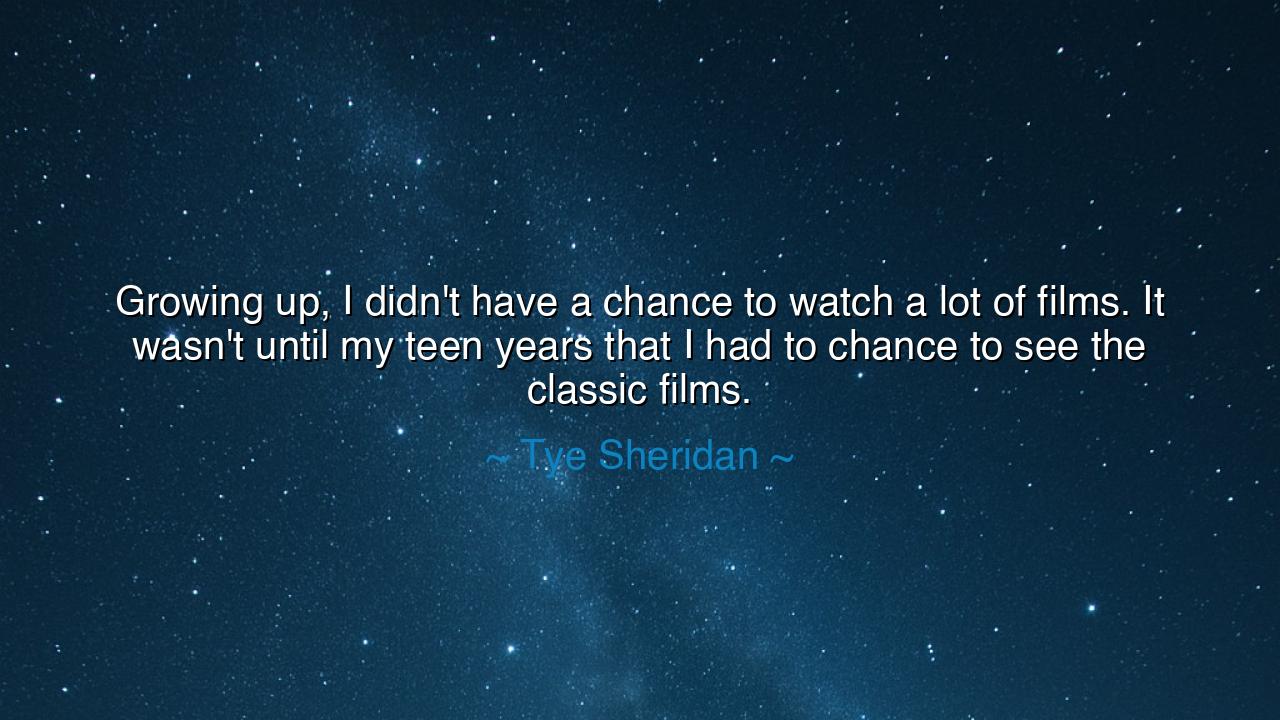
Growing up, I didn't have a chance to watch a lot of films. It
Growing up, I didn't have a chance to watch a lot of films. It wasn't until my teen years that I had to chance to see the classic films.






When Tye Sheridan reflected, “Growing up, I didn’t have a chance to watch a lot of films. It wasn’t until my teen years that I had the chance to see the classic films,” he spoke of an awakening that many encounter in youth—the moment when the eyes are opened to an art form that had long been hidden, and the heart begins to beat in rhythm with the great works of those who came before. His words remind us that the seeds of passion do not always sprout in childhood; sometimes they bloom later, but with no less force, once the right soil has been found.
The origin of this reflection lies in Sheridan’s journey into cinema, a journey that began not with abundance but with scarcity. To grow up without the constant flood of movies was, paradoxically, a gift: it allowed the first encounter with the classics to be profound, almost sacred. For when art is rare, it is treasured more deeply. To see a great film for the first time after years of absence is to drink from a fountain after thirst—it floods the senses, stirs the mind, and awakens the imagination with intensity that the oversaturated may never know.
The teen years are an age of revelation, when the mind grows restless and begins to crave deeper meaning. It is fitting that Sheridan’s encounter with the classics came at this time. For the films that endure—those wrought by hands like Kurosawa, Bergman, Hitchcock, or Chaplin—are not mere entertainments, but lessons in humanity. To meet them in adolescence is to have one’s inner world expanded: to learn that art can be more than pleasure, that it can be mirror, teacher, and oracle.
History shows us that delayed encounters often birth profound transformations. Consider Saint Augustine, who in his youth pursued only worldly pleasures, ignoring philosophy and faith. Yet when he finally opened himself to the wisdom of scripture and philosophy, his conversion shook the foundations of the Western world. Or think of Van Gogh, who discovered painting relatively late, but whose belated passion gave rise to canvases that burn with unmatched intensity. Sheridan’s late discovery of cinema belongs to this pattern: what begins later may burn brighter, because it arrives with hunger.
The deeper meaning of his words is this: art waits for us, and it does not matter when we arrive—only that we do. Too often, people believe that genius must be cultivated from childhood, that greatness comes only to those who start young. Sheridan’s reflection proves otherwise. What matters is not the age of discovery, but the depth of devotion once discovered. To see the classic films in one’s teens is not to be late, but to be timely; for the heart finds art precisely when it is ready to understand it.
The lesson here is eternal: do not lament what you missed in childhood—embrace what you discover now. Life is not measured by early beginnings but by faithful pursuit. The classics of any field—whether films, books, or music—stand ready to meet you whenever you seek them. And when you do, approach them not casually but reverently, for they carry the distilled wisdom of generations, waiting to shape the soul of any who are willing to see.
Practical wisdom flows from this truth. Seek out the classics of your art, your craft, your passion, even if you feel late to the journey. Let no shame in delay hold you back. Read the old books, watch the old films, listen to the enduring songs, for they will teach you more about life than fleeting trends ever could. And if you are young, remember that discovery is not a race—let your curiosity lead you, and when you find what stirs your spirit, devote yourself wholly to it.
Thus, Tye Sheridan’s words rise beyond the story of one actor’s youth. They are a teaching for all generations: that greatness is not in how early we begin, but in how deeply we commit once we discover our path. Films, like all art, stand as beacons across time, ready to awaken those who dare to look upon them with open eyes. And so the teaching is this: when you encounter the classics, at whatever age, receive them as a gift, for they will shape the soul, and in shaping, they will prepare you for the work you were born to do.






AAdministratorAdministrator
Welcome, honored guests. Please leave a comment, we will respond soon